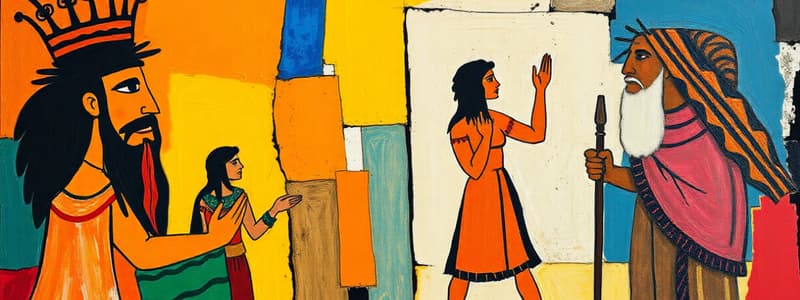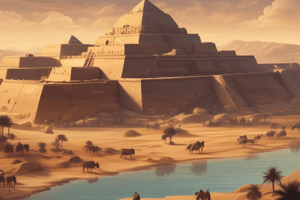Podcast
Questions and Answers
Which ruler is known for uniting all of Mesopotamia under the Babylonian empire?
Which ruler is known for uniting all of Mesopotamia under the Babylonian empire?
- Hammurabi (correct)
- Utnapishtim
- Sargon the Great
- Gilgamesh
Sargon the Great is recognized as the first ruler of the Akkadian Empire.
Sargon the Great is recognized as the first ruler of the Akkadian Empire.
True (A)
Name the king known for his wisdom who constructed the First Temple in Jerusalem.
Name the king known for his wisdom who constructed the First Temple in Jerusalem.
Solomon
___ was tasked with building a boat to survive a great flood, similar to Noah.
___ was tasked with building a boat to survive a great flood, similar to Noah.
Match the following figures with their descriptions:
Match the following figures with their descriptions:
Who is credited with founding Athenian democracy?
Who is credited with founding Athenian democracy?
Aristotle was a student of Socrates.
Aristotle was a student of Socrates.
What did Protagoras famously state about human perception?
What did Protagoras famously state about human perception?
___ was known for his method of questioning, which is referred to as the Socratic method.
___ was known for his method of questioning, which is referred to as the Socratic method.
Match the following figures with their respective contributions or identities:
Match the following figures with their respective contributions or identities:
What is the primary work of Homer?
What is the primary work of Homer?
Cronos is known for his role as a father who devours his children.
Cronos is known for his role as a father who devours his children.
Who discovered ancient Troy and Mycenae?
Who discovered ancient Troy and Mycenae?
Who is known for leading the Israelites out of slavery in Egypt?
Who is known for leading the Israelites out of slavery in Egypt?
Nebuchadnezzar was the founder of the Achaemenid Empire.
Nebuchadnezzar was the founder of the Achaemenid Empire.
What is the significance of Khufu in ancient Egypt?
What is the significance of Khufu in ancient Egypt?
________ is known as the god of mummification and is depicted with a jackal's head.
________ is known as the god of mummification and is depicted with a jackal's head.
Match the following ancient figures with their respective accomplishments:
Match the following ancient figures with their respective accomplishments:
Who was the first king of Israel appointed by Samuel?
Who was the first king of Israel appointed by Samuel?
Which deity is recognized as the King of the Gods in Greek mythology?
Which deity is recognized as the King of the Gods in Greek mythology?
What does the term 'Mesopotamia' mean?
What does the term 'Mesopotamia' mean?
The Assyrians conquered the kingdom of Judah in the 8th century BC.
The Assyrians conquered the kingdom of Judah in the 8th century BC.
Cyrus is known for his oppressive policies towards conquered people.
Cyrus is known for his oppressive policies towards conquered people.
The rivers in Mesopotamia provided fertile soil for agriculture.
The rivers in Mesopotamia provided fertile soil for agriculture.
What two books are part of the Torah that outline the laws for the Israelites?
What two books are part of the Torah that outline the laws for the Israelites?
Who helped Theseus navigate the Labyrinth to defeat the Minotaur?
Who helped Theseus navigate the Labyrinth to defeat the Minotaur?
The central geographic feature around which the civilization of Egypt developed is the ______.
The central geographic feature around which the civilization of Egypt developed is the ______.
Name one way the geographic landscape of Mesopotamia influenced civilization.
Name one way the geographic landscape of Mesopotamia influenced civilization.
Match the following kings to their notable achievements:
Match the following kings to their notable achievements:
Hammurabi's code shows that different social classes received ________ punishments for the same wrongdoing.
Hammurabi's code shows that different social classes received ________ punishments for the same wrongdoing.
Match the following locations with their geographical significance:
Match the following locations with their geographical significance:
Which two natural barriers contributed to Egypt's relative isolation?
Which two natural barriers contributed to Egypt's relative isolation?
The Egyptians believed their gods were separate from their understanding of the natural world.
The Egyptians believed their gods were separate from their understanding of the natural world.
What role did farming play in the development of settlements?
What role did farming play in the development of settlements?
Israel's location was not a significant factor for trade in the ancient world.
Israel's location was not a significant factor for trade in the ancient world.
What concept reflects the idea of achieving balance and harmony in one’s life for the Greek people?
What concept reflects the idea of achieving balance and harmony in one’s life for the Greek people?
What are the two books that reflect on the driving factor for the Israelite people’s way of life?
What are the two books that reflect on the driving factor for the Israelite people’s way of life?
What is eudaimonia for ancient Greeks primarily associated with?
What is eudaimonia for ancient Greeks primarily associated with?
Thucydides wrote about the Persian Wars.
Thucydides wrote about the Persian Wars.
Who are the main figures involved in the Persian Wars?
Who are the main figures involved in the Persian Wars?
The two powerful Greek city-states involved in the Peloponnesian War are __________ and __________.
The two powerful Greek city-states involved in the Peloponnesian War are __________ and __________.
Match the following historians with their focus:
Match the following historians with their focus:
Which battle is notable in the first Persian War?
Which battle is notable in the first Persian War?
The Peloponnesian War arose from the conflict between empires rather than city-states.
The Peloponnesian War arose from the conflict between empires rather than city-states.
What was the primary cause of the Persian Wars?
What was the primary cause of the Persian Wars?
Flashcards
The Epic of Gilgamesh
The Epic of Gilgamesh
The first epic poem written in Mesopotamia, consisting of 12 tablets. Its main character, Gilgamesh, embarks on a journey to find immortality.
Noah
Noah
A key figure in the Hebrew Bible known for building an ark to save humanity and animals from a great flood, symbolizing preservation of life.
Yahweh
Yahweh
The creator god in the Hebrew Bible, believed to be the singular, all-powerful force behind the Universe.
David
David
Signup and view all the flashcards
Solomon
Solomon
Signup and view all the flashcards
Moses
Moses
Signup and view all the flashcards
Sennacherib
Sennacherib
Signup and view all the flashcards
Nebuchadnezzar
Nebuchadnezzar
Signup and view all the flashcards
Cyrus
Cyrus
Signup and view all the flashcards
Ramses II
Ramses II
Signup and view all the flashcards
Anubis
Anubis
Signup and view all the flashcards
Amenhotep IV
Amenhotep IV
Signup and view all the flashcards
Menes (Namar)
Menes (Namar)
Signup and view all the flashcards
Mesopotamia
Mesopotamia
Signup and view all the flashcards
Influence of Geography on Mesopotamian Civilization
Influence of Geography on Mesopotamian Civilization
Signup and view all the flashcards
Social Classes in Mesopotamia
Social Classes in Mesopotamia
Signup and view all the flashcards
Israel's Location in the Ancient World
Israel's Location in the Ancient World
Signup and view all the flashcards
Canaan/Levant
Canaan/Levant
Signup and view all the flashcards
The Israelite Covenant
The Israelite Covenant
Signup and view all the flashcards
Neolithic Revolution
Neolithic Revolution
Signup and view all the flashcards
Aristotle
Aristotle
Signup and view all the flashcards
Theseus
Theseus
Signup and view all the flashcards
Plato
Plato
Signup and view all the flashcards
Herodotus
Herodotus
Signup and view all the flashcards
Protagoras
Protagoras
Signup and view all the flashcards
Eudaimonia
Eudaimonia
Signup and view all the flashcards
Historia
Historia
Signup and view all the flashcards
Thucydides
Thucydides
Signup and view all the flashcards
The Persian Wars
The Persian Wars
Signup and view all the flashcards
The Peloponnesian War
The Peloponnesian War
Signup and view all the flashcards
Imago Dei
Imago Dei
Signup and view all the flashcards
Hammurabi's Code
Hammurabi's Code
Signup and view all the flashcards
Nile River
Nile River
Signup and view all the flashcards
Ma'at
Ma'at
Signup and view all the flashcards
Afterlife in Ancient Egypt
Afterlife in Ancient Egypt
Signup and view all the flashcards
Saul
Saul
Signup and view all the flashcards
Study Notes
Mesopotamia
- Gilgamesh was the king of Uruk, famous for The Epic of Gilgamesh, a 12-tablet epic poem.
- Enkidu was a friend of Gilgamesh who helped him in battles and helped him understand life.
- Utnapishtim was a figure who built a boat to survive a great flood, similar to Noah's Ark.
- Hammurabi unified Mesopotamia under the Babylonian Empire and created Hammurabi's Code, a set of laws.
- Sargon the Great was the first ruler of the Akkadian Empire, a significant Mesopotamian empire.
Ancient Israel
- Noah was a key figure known for building an ark to survive a great flood.
- Yahweh is the God of Israel in the Hebrew Bible.
- Samuel was a prophet who anointed Saul and David as kings of Israel.
- Solomon was a wise king known for building the First Temple in Jerusalem.
- Joshua led the Israelites after Moses, conquering Canaan and establishing the tribes.
- Abraham is considered the founding father of the Israelites, Ishmaelites, and Edomites.
Egypt
- Ramses the Great was known for military campaigns and building programs.
- Anubis was the god of mummification and guiding souls to the afterlife.
- Amenhotep was famous for religious reforms.
- Khufu commissioned the construction of the Great Pyramid of Giza.
- Menes united upper and lower Egypt, founding the first dynasties.
- Osiris is the god of the afterlife and was depicted as green or sick.
- Horus was the son of Osiris and was a major deity in Egyptian mythology.
Ancient Greece
- Ariadne helped Theseus navigate the Labyrinth to defeat the Minotaur.
- Lycurgus founded the Spartan system of government.
- Xerxes was a Persian king involved in the invasion of Greece.
- Pericles was an Athenian statesman during the Golden Age.
- Hesiod was an ancient Greek poet whose work influenced the understanding of Greek mythology and religion.
- Zeus was the king of the gods, ruler of Mount Olympus, and god of the sky, lightning, law, order and justice.
- Cleisthenes founded Athenian democracy.
- Nyx is the Greek goddess of night.
- Aristotle was a student of Plato, a Greek philosopher.
- Homer wrote the Iliad and Odyssey, significant ancient Greek poems.
- Cronos is a Titan, father of Zeus, who ate his children according to Greek mythology.
- Thucydides is known for his writing of History of the Peloponnesian War.
- Theseus was a legendary Greek hero who defeated the Minotaur.
- Plato was a student of Socrates and a teacher of Aristotle.
- Herodotus is known as the Father of History.
- Protagoras was a pre-Socratic Greek philosopher.
- Minos was a legendary king of Crete.
- Socrates was a classical Greek philosopher.
- Leonidas was a king of Sparta.
Studying That Suits You
Use AI to generate personalized quizzes and flashcards to suit your learning preferences.
Related Documents
Description
Test your knowledge on key figures and events from Ancient Mesopotamia and Israel. Explore the epic tales of Gilgamesh and the foundational stories of Israelite history, including notable leaders like Joshua and Solomon. This quiz covers significant cultural and historical contributions from these ancient civilizations.




